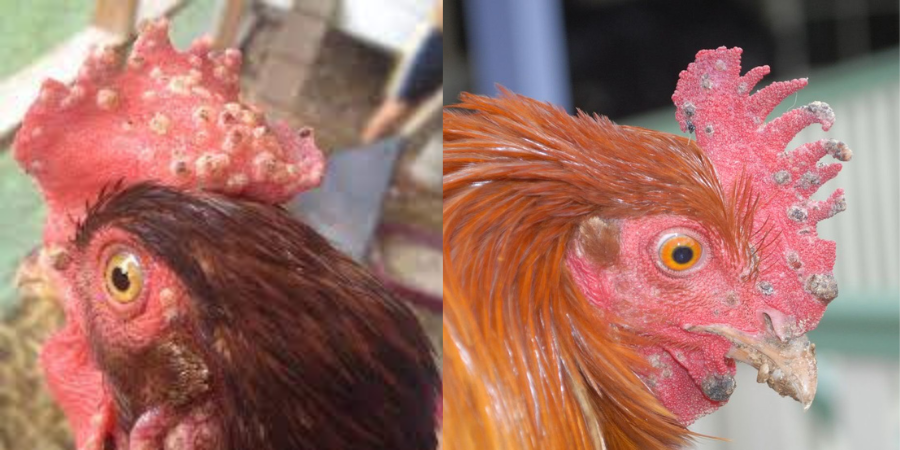Fowlpox is a viral disease that affects birds particularly chickens. It is caused by a virus known as fowlpox virus (FPV) that belongs to the Poxviridae family. The virus primarily infects the skin and upper respiratory tract of birds resulting in characteristic lesions on the comb, wattles and other areas of the bird’s skin. Fowlpox is a significant concern for poultry farmers as it can reduce egg production and result in significant economic losses.
Besides FPV, two other viruses, pigeonpox virus (PPV) and canarypox virus (CPV), can also cause fowlpox-like symptoms in birds.
Physical Effects
Fowlpox is a viral disease that affects chickens and is characterized by the development of wart like lesions on the skin typically around the head, comb, wattles and feet. The lesions may also appear in the mouth and upper respiratory tract making it difficult for the bird to breathe and eat.
The physical appearance of the lesions infected birds may also display other symptoms such as decreased egg production, lethargy and a loss of appetite. In severe cases, fowlpox can even be fatal especially in young birds or those with weakened immune systems.
Viruses
FPV is the most common cause of fowlpox and primarily infects chickens, turkeys and pigeons. The virus can be transmitted through direct contact with infected birds, contaminated feed, water or equipment. Once inside the bird’s body the virus replicates and spreads to other cells resulting in characteristic wart-like lesions on the bird’s skin.
PPV is primarily a disease of pigeons but it can infect other birds such as chickens, turkeys and ducks. Similarly, CPV primarily affects canaries but it can infect other bird species. These viruses have a similar structure and replication process as FPV resulting in fowlpox-like symptoms.
Vaccines
Several vaccines are available to prevent fowlpox in chickens. The most commonly used vaccines are Vectormune FP ILT and Poxine. Vectormune FP ILT is a recombinant vaccine that protects chickens from fowlpox and two other viral diseases infectious laryngotracheitis (ILT) and Marek’s disease. Poxine is a live vaccine that provides protection against fowlpox and is often used in combination with other vaccines to protect chickens from multiple diseases.
Vaccines are essential in preventing fowlpox outbreaks on poultry farms and all birds should be vaccinated to protect against the disease.
Natural Remedies
While vaccines are the most effective way to prevent fowlpox there are some natural remedies that can help manage the symptoms of the disease. A diet rich in vitamins and minerals can help boost the bird’s immune system and improve their overall health. Applying aloe vera gel to the bird’s skin lesions can also help soothe and heal the affected area. Additionally, keeping the birds in a clean and stress-free environment can help prevent the disease from spreading and reduce the severity of symptoms.
Conclusion
Fowlpox is a significant concern for poultry farmers but vaccines and natural remedies can help prevent and manage the disease. It is essential to vaccinate all birds on the farm and maintain a clean and stress-free environment to reduce the risk of infection.
FAQ
Q. Can fowlpox spread to humans?
A. No, fowlpox is a bird-specific disease and cannot spread to humans.
Q. Can a bird get fowlpox more than once?
A. Once a bird recovers from fowlpox, they develop immunity to the disease and are unlikely to get infected again.
Q. What are the common symptoms of fowlpox?
A. Fowlpox symptoms include wart-like lesions on the bird’s skin, reduced egg production, and respiratory problems.
Q. What is Fowlpox vaccine?
A. Two common methods of vaccinating against fowlpox include inoculating the virus into the skin using a bifurcated needle (wing web route) or brushing the virus onto exposed follicles after plucking feathers from the chicken’s thigh.
Q. When do you give fowl pox vaccine?
A. To control and prevent fowlpox in chickens, vaccination is essential. A commercially available fowlpox or pigeonpox vaccine is administered to all chickens using the wing web method, typically at 12-16 weeks of age. After vaccination, the birds should be examined for takes, usually within seven to ten days following the inoculation.



Leave a Reply